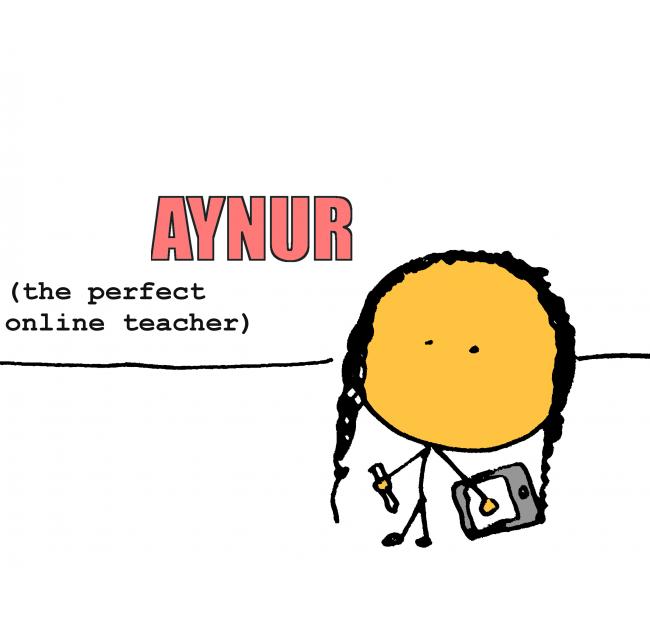OK, so here’s something I know about you. Either you, or someone you know, is learning a language online.
I’m right, right?
Online language learning is growing at a fast and horrifying rate.
One recent report predicted it would be worth over $10 bn by 2025.
That’s more than the hat industry! And everyone likes a good hat.
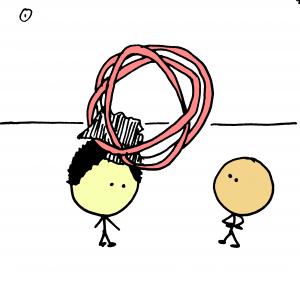
Learning a language is different online from how it used to be. Back in the day, you would go buy a course, go to a room and the teacher would just sort of be there as if by magic.
But online learning means more choice, which means being able to choose your teacher.
And this means you might want to take a little time to think about what kind of person you want as your teacher.
I’ll tell you what kind of person you want. You want someone like Aynur. Remember? You saw Aynur’s picture right at the beginning of this text.
Aynur is the perfect online teacher. So perfect, in fact, that she doesn’t actually exist. I drew her.
What’s she like?
Today, I’m going to tell you what she’s like — using idioms. Because idioms are awesome.
The online side
Learning online is very different from learning in the real world.
I mean, you don’t get offered free tea, but on the bright side, you don’t have to wear any shoes.
But there are other, arguably more important things to think about.
Things like …
She knows how to use her computer
One of the most noticeable things about learning English online is that you do it … online. In fact, it’s probably the most noticeable thing.
So imagine if your teacher had no idea how to turn on his laptop.
Or imagine that she tried to use the mouse by speaking into the buttons.
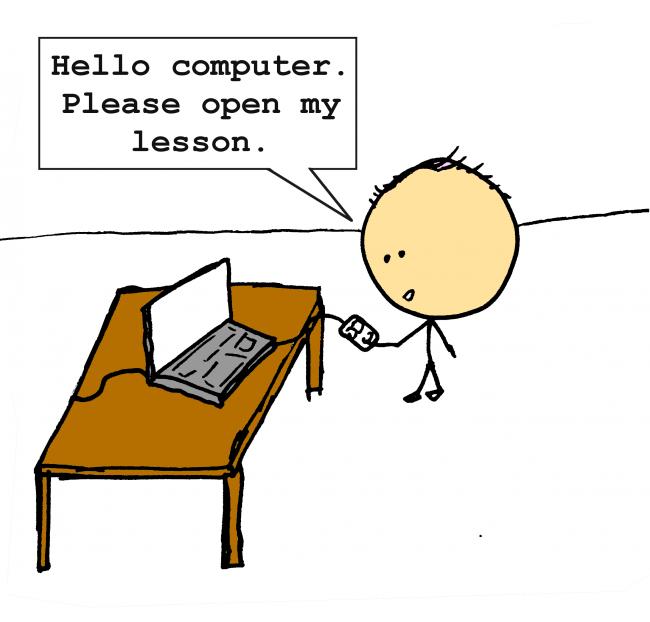
No — that’s really not going to work, right?
You want a teacher who knows how to solve issues — one who can get your microphone working and who can set up their computer for the best connection possible.
These things are important. You need a teacher who’s tech-savvy. Someone who knows how to use technology well.
She needs to know her way around a computer.
Maybe she even knows how to write code, create apps and build a new laptop out of pasta. Then she’d be a techie.
She has a flexible schedule
Another very noticeable thing about online teaching, at least when it comes to one-to-one lessons, is that lesson times become more flexible.
That’s good, right?
You’re a busy person and, these days especially, no one has the same work schedule every day.
So you’re going to want to change your lesson times when a sudden meeting comes up or when the end of the month comes and you’ve got loads of extra work to do or when your boss decides it’d be a good idea if, instead of going to the office, everyone comes on a staff trip to a rabbit farm. You know … for teamwork … or something.
Whatever the reason, you’ll need a teacher who can go with the flow — someone who can accept the changes and adapt to them.
The teaching side:
OK — so Aynur is flexible with her schedule and knows how to use a computer without rubbing peanut butter on the screen. Great!
But what about the actual teaching?
Well, there are a lot of things that make a good teacher.
I’ve decided to put them into three broad categories because I like to make life easier for you.
- Performance
- Knowledge
- Personality
Let’s look at these one by one.
She knows how to perform
OK, here’s the thing: teaching is very tiring.
The day-to-day procedure of the lesson requires some performance skills.
Things move very quickly in the classroom.
That’s partly because language is a complicated thing — it has so many different parts to it.
Fortunately, Aynur is awesome at dealing with all those different things at the same time.
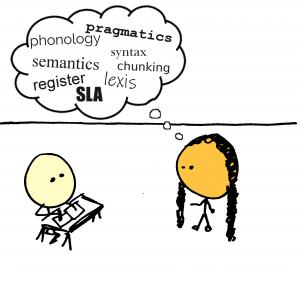
It requires a lot of focus and a lot of multitasking, but she can do it.
You know why?
Because Aynur has got her head screwed on — She’s on the ball.
In other words, she’s smart, able to think quickly and can get a lot done in a short space of time.
Also, do you remember that I said that teaching was tiring a minute ago?
Well — I meant that good teaching is tiring.
But in a positive way, like jogging or bear wrestling. It’s tiring, but you feel kind of energised afterwards.
That’s why a good teacher is always full of beans — full of energy!
Because beans = energy!
She knows what she’s talking about
A good teacher knows what they’re talking about.
It seems obvious, right?
But you’d be surprised by how many times I’ve had a conversation like this:
Random Guy: So, you’re an English teacher, yeah?
Me: Yep.
RG: But you speak English, right?
Me: Yep.
RG: And it’s your first language. Like, you were brought up speaking it?
Me: That’s right.
RG: That’s a bit easy, though, isn’t it? Were you too lazy to get a proper job?
Me: I like your hat.
This is a strange misconception about English teachers: that their job is easy because they don’t need to learn anything new.
But it’s not true.
There’s a big difference between speaking a language and knowing about it.
A really big difference — believe me — I’m still learning every day.
We might know what and how to say something, but do we know why we say it?
In fact, it really doesn’t matter where your teacher is from, but it does matter whether she has a deep, instinctive knowledge about the language.
It’s only when you know something really, really, really well that can you explain it clearly.
And that’s why you’d choose Aynur.
Aynur really knows her onions.
In fact, she knows English grammar, syntax, pragmatics, phonology, the history of English and everything else about it like the back of her hand.
She has a great personality
This is more important than you think.
A couple of years ago I went to a teaching conference where I learned something pretty interesting.
Some guy called John Hattie did a huge study into what makes effective learning.
He studied all sorts of things from class sizes to amount of homework given to use of technology.
And the results were quite surprising.
Out of all the factors he looked at, the student’s perception of and relationship with the teacher had a huge effect on learning.
Learning (and teaching) is a very, very social process, and this doesn’t change when you’re online.
In fact, when we’re talking to someone through a camera on a screen in our bedroom, we don’t use as many social signals (like body language and shared physical space).
That means being online probably makes the social side of the teacher/student relationship even more important.
So what kind of personality does Aynur have?
She’s easy-going!
Remember when I told you that she goes with the flow?
Well, that’s because she has a fairly relaxed personality. Change doesn’t stress her out … she just deals with it.
She’s a people person!
Have you ever had a teacher that clearly doesn’t like people at all?
Perhaps he was shy or perhaps he had no patience with you when you’re trying out new and weird English expressions.
You don’t want that.
You want a people person — someone sociable who clearly enjoys talking to other people.
She’s a good laugh!
Sometimes, if you think about it, this whole teacher/student dynamic is absolutely ridiculous.
I mean, you’re in a situation where you’ve paid someone to use a language on you and talk about that language.
Isn’t that kind of weird?
I find it strange.
But that’s cool! Because strange can be funny.
If you have a teacher with a sense of humour — someone who’s a good laugh, then you can laugh at the silliness of it all.
That puts you both in a more comfortable situation and that will help you learn quicker.
She’s got a bit of screw loose!
OK. This one’s often used negatively.
But I think it can be positive sometimes.
Basically, when you say “She’s got a bit of a screw loose,” it means you think she’s a bit mad.
But I think a small dose of madness to the mix can make for interesting, memorable and, most importantly, effective lessons.
If your teacher is a little strange and a little eccentric and a little … crazy, she’ll be able to give you new and interesting ways of looking at the language, the world and even life itself.
The world is a strange place — why not have a teacher who’s strange, too?
OK — so that was Aynur, the perfect teacher.
Here she is again with her personality idioms:
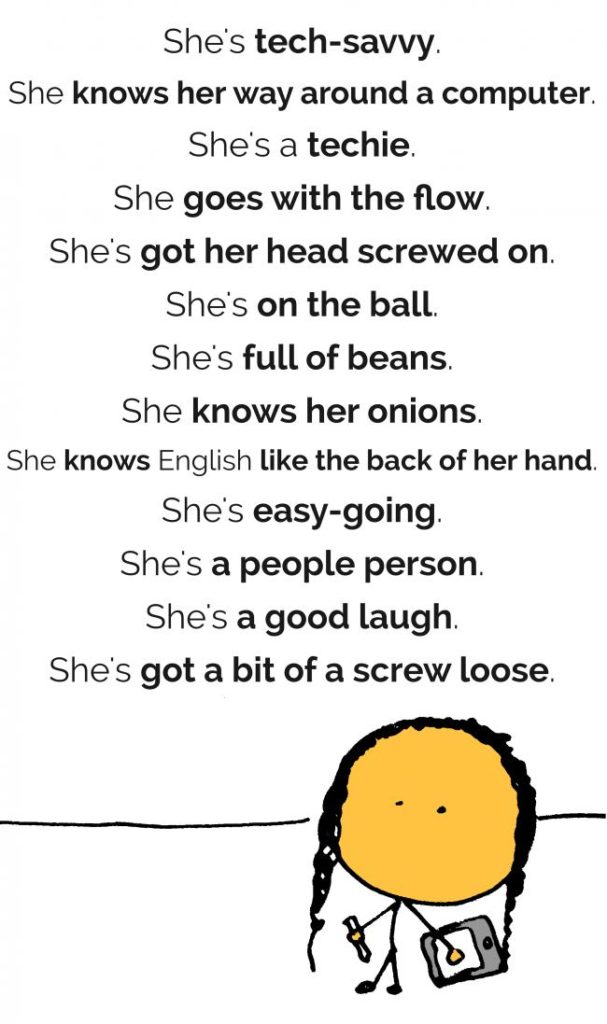
Still looking for lessons? Then go out there and find your Aynur!
And don’t forget that working remotely is an actual learned skill. People don’t just do it well organically, so it’s important to help them. You can complete our DIY lesson to learn more about remote work.
Gabriel Clark, LOS Consultant & Clark and Miller Co-founder
